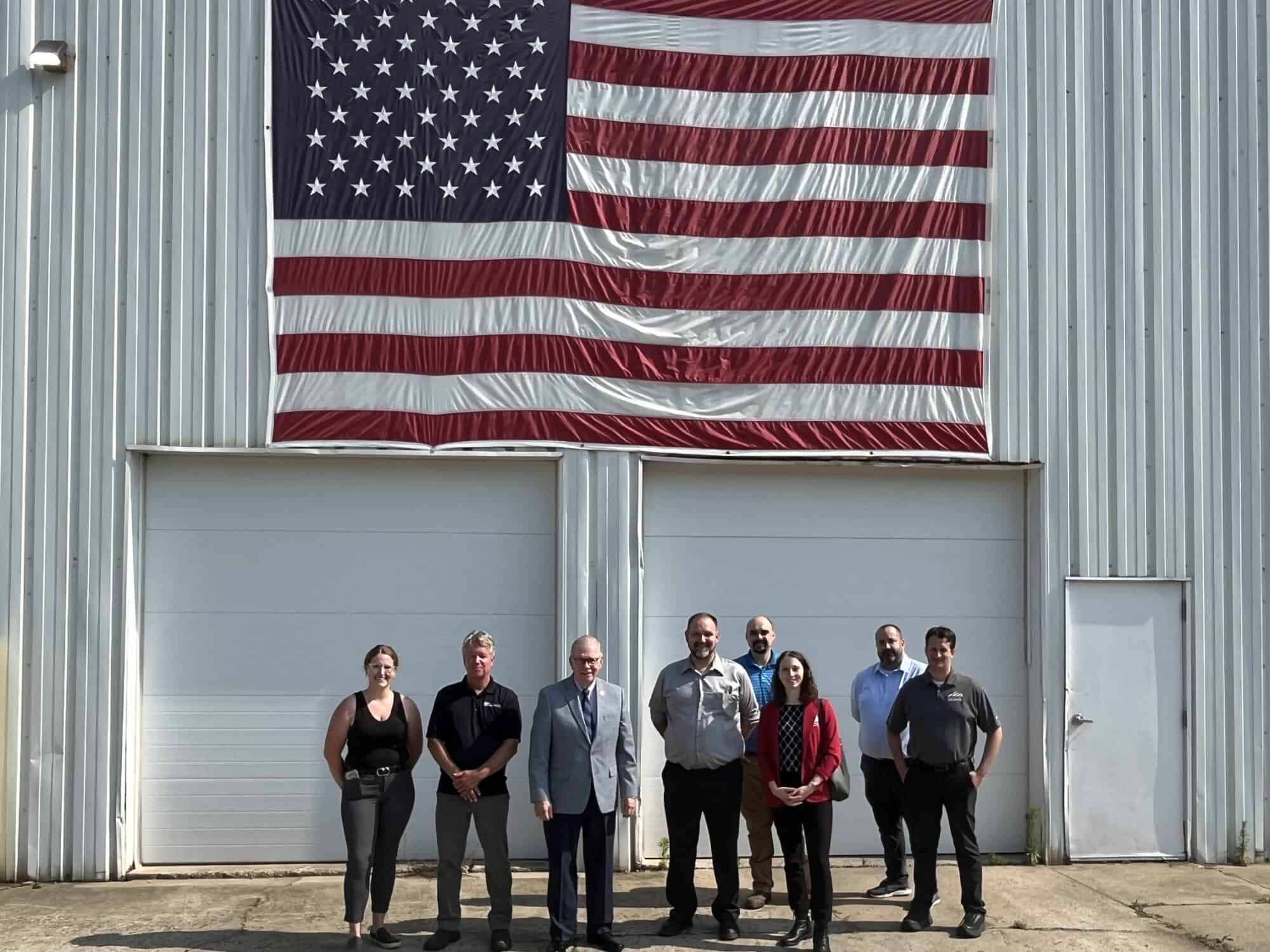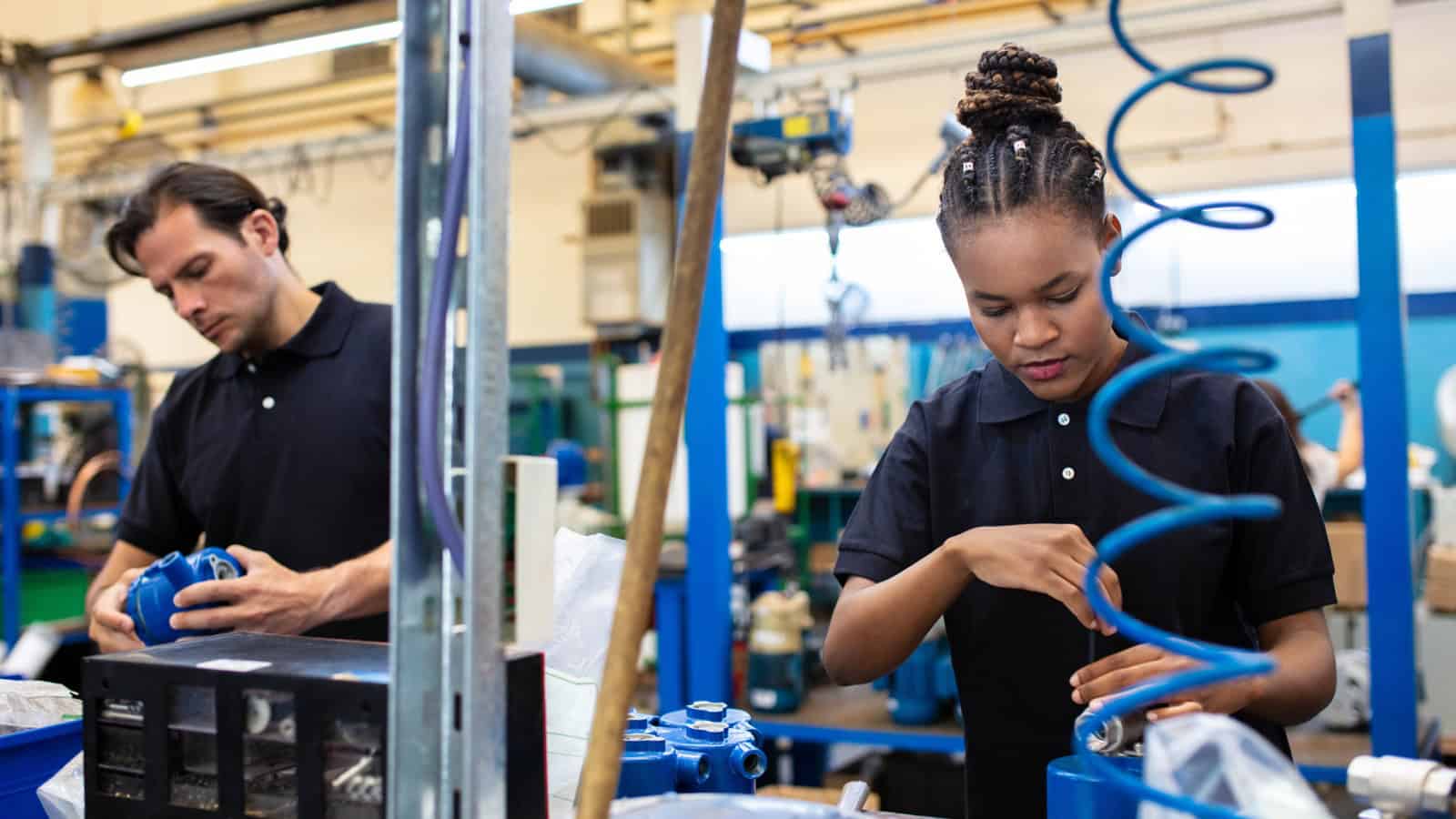Manufacturers Victorious Over SEC in Fifth Circuit Proxy Firm Case
Decision confirms that federal agencies are bound by the rule of law, even as administrations change
Washington, D.C.–Yesterday, the U.S. Court of Appeals for the Fifth Circuit ruled in the National Association of Manufacturers’ favor in NAM v. SEC, overturning the Securities and Exchange Commission’s rescission of critical provisions of its 2020 proxy advisory firm rule. NAM Chief Legal Officer Linda Kelly released the following statement on the ruling:
“This decision confirms that federal agencies are bound by the rule of law, even as administrations change. Manufacturers depend on the SEC to be a steady regulatory hand at the wheel of America’s world-leading capital markets—an obligation the agency abandoned in rescinding the commonsense, compromise 2020 proxy advisory firm rule.
“The NAM Legal Center is proud to have secured this critical victory, which strikes down the SEC’s unlawful about-face and preserves important provisions from the 2020 rule designed to protect manufacturers and Main Street investors from proxy firms’ outsized influence. We will continue to fight in court to uphold the 2020 rule—and to work with the SEC and with Congress to ensure appropriate oversight of these powerful actors.”
Background:
- The NAM has long called for increased oversight of proxy advisory firms. In July 2020, the SEC issued final regulations to enhance transparency and accountability for proxy firms, a move NAM President Jay Timmons called a “long-sought, major win for the industry and millions of manufacturing workers.” In October 2020, the NAM filed a motion to intervene in ISS v. SEC (ISS’s attempt to overturn the rule) in support of these reforms—a case that is still ongoing in the U.S. Court of Appeals for the D.C. Circuit.
- In June 2021, the SEC announced that it was suspending enforcement of the 2020 rule; the NAM filed suit against the SEC in October 2021 challenging this unlawful suspension. The U.S. District Court for the Western District of Texas ruled in the NAM’s favor in that case, vacating the SEC’s suspension of the rule.
- In July 2022, the SEC rescinded critical portions of the 2020 rule, a move that Timmons said “epitomizes ‘arbitrary and capricious’ rulemaking”; the NAM later filed suit to challenge the rescission. The Fifth Circuit decision overturns the SEC’s 2022 rescission of important provisions that increased transparency into proxy firms’ recommendations.
-NAM-
The National Association of Manufacturers is the largest manufacturing association in the United States, representing small and large manufacturers in every industrial sector and in all 50 states. Manufacturing employs nearly 13 million men and women, contributes $2.89 trillion to the U.S. economy annually and accounts for 53% of private-sector research and development. The NAM is the powerful voice of the manufacturing community and the leading advocate for a policy agenda that helps manufacturers compete in the global economy and create jobs across the United States. For more information about the NAM or to follow us on Twitter and Facebook, please visit www.nam.org.
Manufacturers to Congress: Stop Devastating Tax Increases
Jobs, innovation, investments in America all at risk if tax provisions expire at the end of 2025
Washington, D.C. – The National Association of Manufacturers released its Manufacturers’ Outlook Survey for the second quarter of 2024, which highlights the immediate need for Congress to take action to prevent tax increases that will limit the industry’s ability to create jobs, support their communities and compete in the global economy.
“When Congress passed tax reform, manufacturers in the U.S. invested in their workers and businesses at a level that had never before been seen. In 2018, we experienced the best year for job creation in 21 years and the best year for wage growth in 15,” said NAM President and CEO Jay Timmons. “Tax reform was rocket fuel for our industry, but our latest Manufacturers’ Outlook Survey illustrates our industry’s deep concerns about the reversal of these pro-growth incentives. If Congress does not take action, job creation, wage growth and investments in communities—in short, America’s manufacturing edge—will be at risk, as well as our country’s ability to attract meaningful investments into our economy. The House, the Senate and the White House need to come together to reinstate the critical provisions that have already expired or begun phasing out, and to stand strong to protect those set to expire at the end of 2025.”
Background:
- The NAM released “What’s At Stake: Manufacturers Face Damaging Tax Increases in 2025,” a policy explainer which illustrates the consequences of allowing the pro-growth policies and rates from the Tax Cuts and Jobs Act to expire.
- The “Manufacturing Wins” issue page on NAM.org provides a hub for 2025 tax content, as well as opportunities for manufacturers to share their stories directly with Congress and the administration.
Key Survey Findings:
- If Congress does not act to prevent tax increases, survey respondents say that increased taxes will limit capital investment opportunities (73.0%), decrease job creation (65.4%), increase difficulty competing globally (52.6%) and reduce R&D spending (51.7%).
- Nearly 94% of respondents agree that Congress should act before the end of 2025 to prevent scheduled tax increases on manufacturers.
- In Q2, 71.9% of respondents felt either somewhat or very positive about their company’s outlook, the seventh straight reading below the moving average (74.8%).
- More than 67% of manufacturers cited the inability to attract and retain employees as their top primary challenge, followed by rising health care costs (66.7%), an unfavorable business climate (59.6%) and a weaker domestic economy (56.8%).
The NAM releases these results to the public each quarter. Further information on the survey is available here.
-NAM-
The National Association of Manufacturers is the largest manufacturing association in the United States, representing small and large manufacturers in every industrial sector and in all 50 states. Manufacturing employs nearly 13 million men and women, contributes $2.89 trillion to the U.S. economy annually and accounts for 53% of private-sector research and development. The NAM is the powerful voice of the manufacturing community and the leading advocate for a policy agenda that helps manufacturers compete in the global economy and create jobs across the United States. For more information about the NAM or to follow us on Twitter and Facebook, please visit www.nam.org.
NYT Investigation: Pharmacy Benefit Managers Drive Up Costs for Employers

Although they were created to keep prescription drug prices down, pharmacy benefit managers “frequently do the opposite” (The New York Times, subscription)—and that’s one of the main reasons the NAM has long advocated for their reform.
What’s going on: “The job of the P.B.M.s is to reduce drug costs. Instead, they …
steer patients toward pricier drugs, charge steep markups on what would otherwise be inexpensive medicines and extract billions of dollars in hidden fees, a New York Times investigation found.”
Why it’s important: PBMs frequently charge employers and government programs, such as Medicare, many times the wholesale cost of a medication and keep the difference, according to the Times.
- And it’s not just those taking prescriptions who pay; when drug costs are inflated, everyone ends up paying higher insurance premiums.
- What’s more, “[b]ecause of recent mergers, [the big three PBMs] are becoming more dominant, collectively processing roughly 80 percent of prescriptions in the United States.” That’s up more than 30% from just 12 years ago.
Working around a workaround: In 2018, in response to growing pressure from employers to get PBMs to share more of the discounts from drug manufacturers, PBMs set up entities known as group purchasing organizations.
- These GPOs pass savings to employers—but they “also began imposing new fees on drug manufacturers,” money they were not contractually bound to pass on to clients.
- The result: “Employers are none the wiser. They receive rebates. But they can’t see the billions of dollars in fees that the G.P.O.s take for themselves.”
Congress makes moves: Since the beginning of last year, seven House and Senate committees have passed PBM-reform legislation, including policies to increase transparency into PBMs’ business practices, delink PBM compensation from medications’ list prices and ensure that rebates are fully passed through to the plan sponsor or patient.
- The NAM has been crucial in educating lawmakers on the need for these reforms and continues to advocate for PBM reform to be signed into law this year.
The last word: “PBMs drive up health care costs for manufacturers and manufacturing workers,” said NAM Vice President of Domestic Policy Charles Crain. “Congress must act as soon as possible to enact comprehensive PBM reform that benefits employers by making PBM contracts more straightforward, transparent and predictable—and benefits workers by reducing the prices they pay out of pocket for their prescriptions.”
Rep. Walberg Visits Madsen Steel Wire Products to Discuss Tax Priorities

Rep. Tim Walberg (R-MI) recently visited Madsen Steel Wire Products in Bronson, Michigan, to discuss critical tax priorities with company leadership and members of the National Association of Manufacturers.
The visit, led by Madsen Steel Wire Products General Manager Steve Cochran, focused on the importance of maintaining a competitive tax code to support growth and innovation in the manufacturing sector in the face of scheduled expirations of key pro-manufacturing tax policies in 2025. The visit also underscored the essential role manufacturing plays in economic growth and stability.
The topline: During the tour, Rep. Walberg witnessed firsthand the impact of pro-growth tax policies on manufacturers.
- “Visiting Madsen Steel Wire Products reinforced the need for tax policy that supports manufacturing growth and job creation,” Walberg said. “We in Congress must act before the end of 2025 to preserve 2017 tax reform and avoid the devastating impacts to small manufacturers that will come to pass if these pro-growth policies are not preserved.”
A close-up view: Cochran shared the company’s experience with 2017 tax reform, highlighting how tax reform enabled significant investments in new equipment and workforce expansion.
- “Tax reform in 2017 was a game-changer for us; it allowed us to invest in our people and technology, driving our competitive edge,” said Cochran. “But the looming expiration of key tax reform provisions creates significant uncertainty for our future planning.”
- “In particular, we face a potential double-whammy as our tax rates are scheduled to increase next year at the same time the pass-through deduction expires—resulting in significant and damaging tax increases for us and other small manufacturers.”
An economic impact: The economic impact of manufacturing on local communities was a central theme of the discussion.
- “Manufacturers like Madsen Steel Wire Products are vital to communities like Bronson,” said Branch County Economic Growth Alliance Director Audrey Tappenden. “Their strength is critical to our local economy and broader industries.”
The big picture: Walberg and Cochran also discussed the broader economic impact of tax reform. The NAM’s recent survey found that 94% of manufacturers believe Congress should act before the end of 2025 to prevent tax increases. The survey also indicated that if tax increases take effect, 73% of manufacturers would limit capital investments and 65% would reduce job creation.
- “Manufacturing is the backbone of our local economy,” said Cochran. “Our ability to invest in new technologies and expand our workforce is dependent on preserving tax reform, which will directly translate to more jobs and better wages for our community.”
The bottom line: “The stakes are high,” said Walberg. “We need to ensure that the tax code continues to support the hardworking men and women in manufacturing. It’s about maintaining a level playing field and ensuring that manufacturers like Madsen Steel Wire Products can thrive—supporting small business growth and the economic health and prosperity of our communities.”
The takeaway: “The NAM launched ‘Manufacturing Wins ’ to preserve tax reform, and Rep. Walberg’s visit to Madsen Steel underscores the critical role of tax policy in driving the success of manufacturers in America,” said NAM Vice President of Domestic Policy Charles Crain. “Congress must act before the end of 2025 to prevent devastating tax increases—bolstering manufacturing across the country and supporting the economic stability and growth of local communities like Bronson, Michigan.”
Manufacturers Rally to Advance Nuclear Energy

The NAM is pressing the U.S. Senate to support a bill that would promote clean nuclear energy development.
What it does: The legislation, called the Accelerating Deployment of Versatile, Advanced Nuclear for Clean Energy (ADVANCE) Act, offers a number of components to accelerate the development and commercialization of advanced nuclear reactor technologies. It includes:
- Permitting and approval reform to make it easier for reactor projects to locate on brownfield sites, land that is underused or has been abandoned because of industrial waste;
- “Early licensing work” provisions to help deploy reactors more quickly at national security infrastructure sites;
- A series of awards to encourage companies to develop advanced-reactor technology; and
- Hiring support for the Nuclear Regulatory Commission, which is understaffed to deal with the level of applications for new reactors.
Where it stands: The legislation was reported out of the Senate Environment and Public Works Committee with a bipartisan vote of 16–3, and companion legislation was passed in the House of Representatives by an overwhelming vote of 365–36. Now, the NAM is pushing the Senate to pass the bill.
Why it matters: “Nuclear-generated power is an important part of an all-of-the-above energy strategy, which is necessary to meet the power needs of a growing manufacturing sector,” said NAM Managing Vice President of Policy Chris Netram. “The ADVANCE Act would accelerate the development and commercialization of advanced nuclear reactor technologies through reforms to the existing licensing and permitting systems.”
Our action: The NAM is urging Congress to support the bill ahead of the Senate’s vote, detailing its benefits in a letter to senators.
The last word: “Manufacturers create jobs that support families, and develop and deploy innovative technologies that make our environment cleaner,” said Netram. “Increasing our nation’s energy supply, including the growth of nuclear power, will support manufacturing investments and jobs across America.”
NAM, Partners Urge Administration to Withdraw “March-in” Proposal

If finalized, guidance proposed last year by the Biden administration to allow the federal government to seize manufacturers’ intellectual property rights would be ruinous to the U.S. innovation economy, the NAM and state partners told Commerce Secretary Gina Raimondo this week.
What’s going on: In December, the Biden administration issued a proposal to enable government agencies to “march in” and revoke companies’ patent exclusivity if a product’s development was funded in any part by federal research dollars.
- Under the proposal, the government’s decision of whether to march in would be based on a product’s price—effectively imposing government-mandated price controls on innovative products like clean energy solutions, next-generation semiconductors and lifesaving medicines.
Manufacturers fight back: The NAM and a coalition of regional and state manufacturing associations are pushing back, highlighting the importance of ironclad IP rights to groundbreaking innovation.
- “[T]urning groundbreaking R&D into innovative products for the American people is only possible if creators—from university researchers to early-stage entrepreneurs to established businesses—can rely on strong intellectual property protections,” the associations told Raimondo.
Small business impacts: Startups and small businesses would pay the heaviest toll if the new march-in standards are finalized.
- Scientists and researchers at universities nationwide will face difficulties in partnering with the industry and in founding startups based on their research, “strik[ing] a blow to the local economies in [all 50] states that depend on university-centered innovation hubs for job creation and economic growth.”
- If a promising idea makes it out of the lab, outside investors will be reluctant to inject the capital necessary for further R&D and product development—resulting in fewer life-changing and lifesaving products for the American people.
What needs to happen: Manufacturers are calling on the Biden administration to reverse course.
- “We urge you to protect our local, state and regional economies, which benefit from breakthrough research, entrepreneurship and modern manufacturing, by withdrawing the proposed march-in guidance.”
Manufacturers Launch “Manufacturing Wins” Campaign to Prevent Devastating Tax Increases in 2025
Washington, D.C. – The National Association of Manufacturers has launched an industry-wide effort to educate Congress and the administration on the need for urgent action to preserve the pro-growth 2017 tax reform provisions set to expire at the end of 2025.
NAM President and CEO Jay Timmons, Ketchie President and Owner and NAM Small and Medium Manufacturers Group Chair Courtney Silver and Husco President and CEO and NAM Executive Committee member Austin Ramirez released the following statements:
“The transformative impact of 2017 tax reform cannot be overstated. Tax reform was rocket fuel, igniting a resurgence in the manufacturing sector. It put into place competitive policies that fueled record job creation, wage growth, capital investment and innovation,” said Timmons. “However, if Congress does not act, next year’s expiration of these powerful force multipliers will undo much of the progress made by our industry and America. Manufacturers are putting a stake in the ground and warning policymakers to stand up against any tax increases on the people who make things in America.”
“If Congress does not act before the end of 2025, manufacturers will be competing with one hand tied behind our back. Manufacturers across the country promised to take tax reform’s pro-growth provisions and ensure they had a direct positive impact on American lives,” said Silver. “We kept our promises. We created jobs, we purchased equipment and we gave back to our communities. I urge Congress to build on the promise of tax reform to enable manufacturers to do even more.”
“The stakes are high—the economic damage will be severe if Congress decides that it’s time to end tax reform,” said Ramirez. “Allowing tax reform to sunset means tax hikes on manufacturers and manufacturing families, which will slow our sector’s growth and prevent us from investing in job-creating projects that support communities across the country and boost our economy.”
Background:
Critical tax reform provisions are set to expire at the end of 2025, resulting in significant tax increases for virtually all manufacturers.
- A recent NAM survey found that 94% of manufacturers believe Congress should act before the end of 2025 to prevent these tax increases.
- If Congress fails to act, 73% of manufacturers would be forced to limit capital investments, 65% would have to reduce job creation and 52% would spend less on R&D, among other damaging impacts.
- Additionally, 93% of pass-through manufacturers said that the loss of the pass-through deduction, which ensures a level-playing field for small businesses that pay tax at individual tax rates, would harm their ability to grow, create jobs and invest in their business.
- Released by the NAM today, What’s at Stake: Manufacturers Face Devastating Tax Increases in 2025, explores the pro-growth policies from the Tax Cuts and Jobs Act and explains why allowing them to expire would damage the manufacturing economy.
- The “Manufacturing Wins” issue page on NAM.org provides a hub for 2025 tax content as well as opportunities for manufacturers to share their stories directly with Congress and the administration.
- The NAM submitted a letter today to House Ways and Means Committee Chairman Jason Smith (R-MO) and Ranking Member Richard Neal (D-MA) and Senate Finance Committee Chairman Ron Wyden (D-OR) and Ranking Member Mike Crapo (R-ID) outlining manufacturers’ tax priorities for 2025.
-NAM-
The National Association of Manufacturers is the largest manufacturing association in the United States, representing small and large manufacturers in every industrial sector and in all 50 states. Manufacturing employs nearly 13 million men and women, contributes $2.89 trillion to the U.S. economy annually and accounts for 53% of private-sector research and development. The NAM is the powerful voice of the manufacturing community and the leading advocate for a policy agenda that helps manufacturers compete in the global economy and create jobs across the United States. For more information about the NAM or to follow us on Twitter and Facebook, please visit www.nam.org.
10th Anniversary of NAM President and CEO’s “Four Pillars” Speech

NAM President and CEO Jay Timmons delivered a defining speech at the Friends of Adam Smith Awards a decade ago. This speech outlined the “Four Pillars of an Exceptional America,” a framework that continues to shape the NAM’s mission and advocacy.
Flashback: On June 11, 2014, in his speech accepting the 2014 Business Citizen Award for an outstanding record of achievement in advancing the principles of free enterprise, Timmons introduced the four pillars that underpin American exceptionalism and manufacturing strength.
The Four Pillars:
- Free enterprise: The economic system that unleashes innovation, creates opportunity and lifts humankind out of poverty more than any other economic system has in the history of the world.
- Competitiveness: Our ability, when untethered from government overreach, to prosper and win in a global economy.
- Individual liberty: The unique freedoms enshrined in our Constitution and Bill of Rights that enable us to live and succeed.
- Equal opportunity: Our shared belief that we all have the ability to contribute to the betterment of our families, our companies, our communities and our country.
Manufacturers’ approval: The NAM Board of Directors unanimously adopted these pillars as part of the association’s official policy positions, guiding the NAM’s Competing to Win agenda to bolster the competitiveness of manufacturers in the United States.
The impact: These pillars have guided the NAM’s efforts in promoting policies that support a robust manufacturing industry and a strong national economy, helping to draw support across the political divide for manufacturers’ principles-based agenda.
The bottom line: “The Four Pillars are not just about manufacturing; they are about sustaining the promise of America,” said NAM Executive Vice President Erin Streeter. “That’s why these values have helped us ensure the manufacturing agenda is a post-partisan agenda, drawing support for so many of our priorities from policymakers and by candidates—on both sides of the aisle—on the campaign trail. We will continue to work with anyone who wants to advance these values.”
NAM Launches Campaign to Prevent Tax Increases on Manufacturers

The NAM today launched an industry-wide campaign to educate legislators, candidates and the Biden administration on the urgent need for action to preserve pro-growth tax policies scheduled to expire at the end of next year.
What’s going on: Critical reforms from the 2017 Tax Cuts and Jobs Act will expire at the end of 2025. The NAM’s Manufacturing Wins campaign is designed to ensure that Congress preserves 2017 tax reform in its entirety to avoid significant economic damage in the manufacturing sector and across the broader economy.
What’s at stake: If they do not, at the end of 2025, virtually all manufacturers will face devastating tax increases that will cost manufacturing jobs, stifle growth and stunt innovation. Small manufacturers, which are often organized as pass-through businesses that pay tax at the individual tax rates, face increases in their income taxes and a loss of tax reform’s 20% pass-through deduction.
- Family-owned manufacturers will experience changes to the estate tax that subject more of their assets to taxation upon the death of a loved one.
- Investments in manufacturing growth will continue to be delayed without action to restore immediate R&D expensing, accelerated depreciation for capital equipment purchases and a pro-growth interest deductibility standard.
Learn more: What’s at Stake: Manufacturers Face Devastating Tax Increases in 2025 explores the tax provisions up for debate next year—and highlights the NAM’s policy suggestions for Congress to prevent devastating tax hikes.
Manufacturers at risk: A recent NAM survey found that if Congress fails to prevent the 2025 expirations, 73% of manufacturers would be forced to limit their capital investments, 65% would have to reduce job creation and 52% would spend less on R&D. Further, 93% of pass-through manufacturers said that the loss of the pass-through deduction would harm their ability to grow, create jobs and invest in their business.
- Some 94% of manufacturers believe Congress should act before the end of 2025 to prevent these tax increases.
The last word: “Manufacturers across the country promised to take tax reform’s pro-growth provisions and ensure they had a direct positive impact on American lives,” said NAM Small and Medium Manufacturers Group Chair Courtney Silver, president and owner of precision machining company Ketchie.
- Silver has made the case repeatedly that these tax priorities are critical for the success of small and medium-sized manufacturers in the United States.
- “We kept our promises. We created jobs, we purchased equipment and we gave back to our communities. I urge Congress to build on the promise of tax reform to enable manufacturers to do even more.”
NAM, ACC Challenge EPA’s National Drinking Water Rule

The NAM and the American Chemistry Council yesterday filed a petition challenging the Environmental Protection Agency’s first-ever national drinking water standard limiting the presence of six types of per- and polyfluoroalkyl substances, or PFAS.
What’s going on: The organizations are seeking to overturn the final rule—issued in April by the EPA—in the D.C. Circuit Court of Appeals on the grounds that it exceeds the agency’s authority under the Safe Drinking Water Act of 1974 and “is arbitrary, capricious and an abuse of discretion,” in violation of the Administrative Procedure Act.
- Under the rule, PFAS in municipal water systems are limited to near-zero levels. Systems nationwide will have three years to monitor for the chemicals and two subsequent years to install technology to reduce the compounds’ levels in the water.
- The water systems will (and, in fact, have already begun to) sue manufacturers to cover their costs. Meanwhile, plaintiffs’ attorneys are using the standard in product liability and greenwashing suits against manufacturers.
- PFAS are a diverse group of chemicals that have been used widely for decades due to their unique ability to douse fires and resist grease, stains and corrosion. Today they’re a key component in a wide range of critical products, from semiconductors, to the components of the electrical grid, to renewable-energy production equipment.
Why it’s problematic: The final regulation of PFAS “is wholly infeasible and threatens these vital substances’ continued application in manufacturing processes,” said NAM Chief Legal Officer Linda Kelly, adding that the agency’s rulemaking is based “on a deeply flawed cost-benefit analysis” and fails to follow Safe Drinking Water Act procedure and other statutory requirements.
- “In many instances, there is no viable alternative for these chemicals, and companies may be forced to change plans dramatically” to follow the new rule, NAM Managing Vice President of Policy Chris Netram said in April.
- “In everyday life, including emergency situations like a fire or operating room circumstance, there’s a real reliance on these products—it’s not just about job losses and costs but fundamental decisions that have widespread ramifications,” Netram added recently.
What should be done: The rule should be vacated as soon as possible, the NAM and the ACC told the court.
